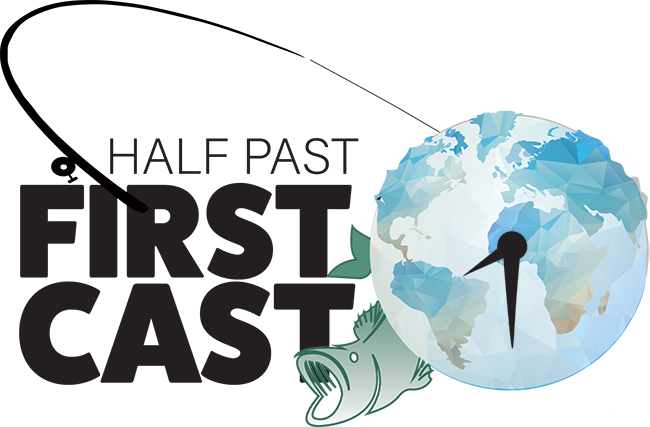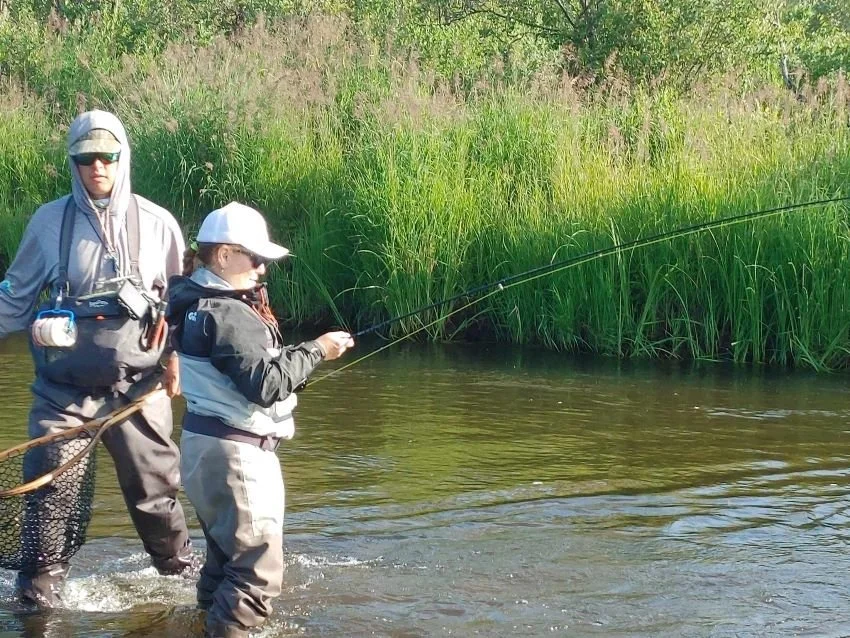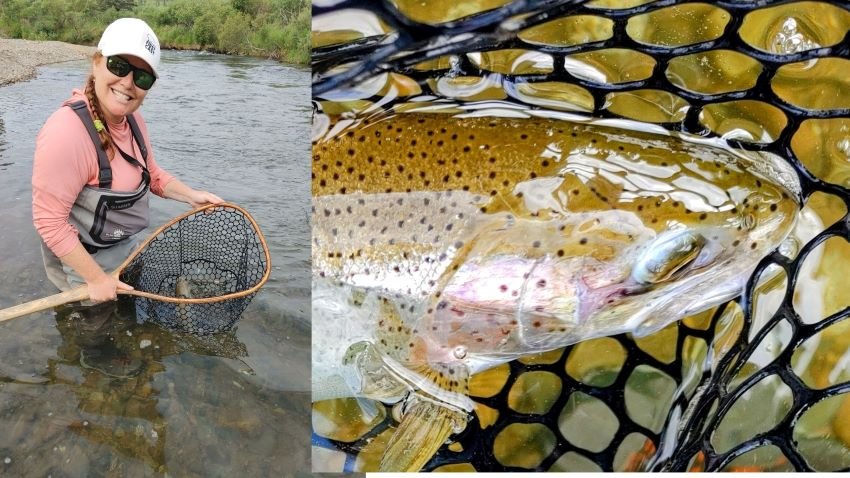Don’t Fear the Fly Rod
When Hanna and I visited a Montana ranch for our 10th anniversary in 2015, we scheduled a float fishing trip on the Bitterroot River as one of our activities. We didn’t want to be completely unprepared, so upon arrival we asked for a quick casting lesson. Out trotted a grizzled guide with a mediocre attitude. Perhaps he’d had a bad day on the water. Maybe his clients had stiffed him on a tip. There’s a chance he was always this way.
“Ever fished before?” he asked.
“Yes,” I responded.
“For what?”
“We have a bass boat and we fish for bass pretty much every week,” I told him.
“Well, that’s worse than if you didn’t fish at all,” he concluded. “You’ll probably have all sorts of bad tendencies and habits that’ll be hard to overcome.” Then he gave us a cursory lesson and went home.
As it turned out, our eventual guide Steve Grant was a patient and skilled teacher. He didn’t belittle our lack of experience. He encouraged us to expand our horizons. He led us to cutthroats, rainbows and cutbows. We had such a fun day that as soon as it was over Hanna and I decided to replace another planned activity with a second float. Our casting may not have been much better later that week, but it was a great decision.
We returned home from Montana looking for more fly fishing opportunities but life got in the way – until Keith Combs and I returned to Alaska and got another chance to fly fish on trophy trout and salmon waters. I’ve been back twice since, and the fly fishing on remote streams is truly the part I look forward to the most, even though I’m sure that my casting surely still looks like a man trying to kill a yellowjacket in a phone booth with a tennis racket. You know what? I don’t really care. While I’d like to be better, and hope to work on that in the not-too-distant future, it has opened up new avenues for on-the-water enjoyment.
Bass Anglers Who Fly Fish
You can definitely chase largemouths and smallmouths with the fly rod, but most of us who live in “tournament mode” rarely do so. Nevertheless, there’s a surprisingly heavy crossover between serious bass anglers and fly fishing obsession.
You may associate Randall Tharp most closely with a flipping stick, but his current obsession is chasing tarpon and redfish near his Florida home with the long rod. Same with my longtime boat dealer, Brian Lancaster, who has a house in the Keys for the express purpose of chasing ‘poons.
Even at BASS, there are lots of not-so-secret fly rodders. Steve Wright, the best day-to-day writer in the tournament world today, wrote a legendary book at trout fishing in Arkansas. Trey Reid, with whom I covered numerous Bassmaster Classics, is an editor at Tail Fly Fishing, and is particularly in love with bonefish. JD Blackburn, who is an “agent” and advisor for many of the pro anglers and consults for numerous large companies, also fly fishes any chance he gets.
All of the guys listed above have the angling world at their feet, and can do just about anything they want on the water, and they always come back to fly fishing. That should tell you something.
Why Should You Take Up Fly Fishing?
As anglers, we tend to live in distinct silos. There are tournament bass anglers, fly rod trout chasers, tuna poppers, billfishermen, and many more cliques, without necessarily much obvious intermingling. I’d argue that most of us are afraid to step out of our narrow comfort zones and to look like a beginner in our chosen sport. It’s easier to stay in your lane and not be surprised – but novelty is exactly why I think fly fishing can be so restorative for many of us. Here are the three main reasons you might consider trying it:
Sometimes it’s simply the most effective way to catch fish. They may be feeding on a particular bug or terrestrial and you need to replicate that precisely to get bit. Also, despite my initial misgivings, it can be more efficient – without having to reel a lure all the way in to make a new presentation, it’s possible to put your offering in front of more fish in the course of a day.
Sometimes it’s the only way to fish. Many trout streams are fly-only. Some are even barbless hooks only as well. Many lodges catering to bonefish, tarpon or permit anglers focus on fly anglers, so even if you’re allowed to use conventional tackle, they may not be set up for it.
Finally, it expands your horizons and keeps fishing new. This is a sport where it’s easy to get into a rut of same waters, same seasonal patterns, same presentations. By getting outside of that confining box, you open your mind to new ways of thinking about the sport. Not only does trying new things get me excited, but I believe that it’s made me a better, more thoughtful bass angler.
Increase Your Fly Fishing Comfort Level
Heading from one form of fishing into the fly fishing world is the worst sort of recipe for embarrassment – you’ve established your identity as an angler, yet you know very little about what you’re doing. In fact, as that Montana instructor implied, some things are precisely the opposite. For example, it’s the line propelling the lure, instead of casting or spinning gear where the lure pulls the line. Additionally, the hooksets may be completely backwards. Nevertheless, if you’re open to the experience (and you really should be) here are some steps that’ll help you minimize embarrassment and maximize effectiveness and joy:
Learn the basics. Yes, there’s a rod, reel and line, but just like other types of fishing there are different kinds of lines for different purposes, along with all sorts of specialized gear for different applications. You can find all sorts of non-jargony primers on the web, especially on YouTube. Alternatively, get a book. I bought Tom Rosenbauer’s The Orvis Guide to Beginning Fly Fishing and found that it answered most of my questions, plus some I didn’t know that I had.
Plan to go someplace where you’re likely to experience success. A trip to the Bahamas for spooky flats bonefish is likely not your best first choice, nor is billfishing. Choose a species that is readily available and a place where they’re plentiful and the presentations are not likely to be super difficult. Obviously, world-class fisheries like those in Alaska are ideal, but even if that doesn’t fit your lifestyle there are likely some good options closer to home.
Before you go, try to get in some basic casting lessons. There are Trout Unlimited chapters and fly fishing clubs all over the place, and most will be glad to start you down the right path. Many Orvis stores or independent fly shops have free or inexpensive introductory casting lessons.
Hire a guide who provides the proper equipment. Not only does this prevent you from having to go out and purchase gear that you might need at some point, possibly the wrong gear, but you’ll also have someone to walk you through the process, in real time, offering feedback and instruction.
Be open and honest about your experience level and solicit feedback from your guide or instructor. In fact, if they don’t offer instruction or constructive criticism throughout the day, I’ll ask them to tell me what I’m doing wrong, or what I could be doing better – or for a demonstration. Different teachers teach in different ways but you should learn something every time you’re out. If you fail to get a bite, or lose a fish, ask what you could have done better.
Don’t be afraid. Once you get the basic motion down, however awkward it might feel, try some longer casts or some casts that are tighter to cover. You’ll have to push yourself if you want to get better. Again, I’m still admittedly awkward with this gear, and certainly not ready for the bonefish flats, but at least now I have enough confidence – or perhaps bravado – not to worry so much about what others think.
Remember, that’s a lot of line whipping around. With a spinning or baitcasting rod, you’re unlikely to have much line dangling from the rod tip, but during a fly cast the entire length of your cast can be flying around behind, overhead and to the side of you. If you’re not careful, you can land your fly in a thick tree behind you, in your scalp, or wrap your line around another angler’s neck.
Sorry if I convincingly encouraged you to embark on a new time-consuming and expensive hobby. I don’t promise that you’ll be Lefty Kreh or able to do some serious Brad-Pitt-in-that-movie stuff immediately, but if you go into it with the right attitude, I promise that fly fishing can open new windows and enhance your overall fishing experience substantially.









